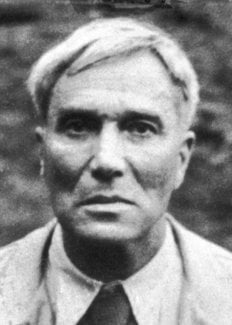Boris Pasternak
Biographical

Boris Leonidovich Pasternak (1890-1960), born in Moscow, was the son of talented artists: his father a painter and illustrator of Tolstoy’s works, his mother a well-known concert pianist. Pasternak’s education began in a German Gymnasium in Moscow and was continued at the University of Moscow. Under the influence of the composer Scriabin, Pasternak took up the study of musical composition for six years from 1904 to 1910. By 1912 he had renounced music as his calling in life and went to the University of Marburg, Germany, to study philosophy. After four months there and a trip to Italy, he returned to Russia and decided to dedicate himself to literature.
Pasternak’s first books of verse went unnoticed. With Sestra moya zhizn (My Sister Life), 1922, and Temy i variatsii (Themes and Variations), 1923, the latter marked by an extreme, though sober style, Pasternak first gained a place as a leading poet among his Russian contemporaries. In 1924 he published Vysokaya bolezn (Sublime Malady), which portrayed the 1905 revolt as he saw it, and Detstvo Lyuvers (The Childhood of Luvers), a lyrical and psychological depiction of a young girl on the threshold of womanhood. A collection of four short stories was published the following year under the title Vozdushnye puti (Aerial Ways). In 1927 Pasternak again returned to the revolution of 1905 as a subject for two long works: Leytenant Shmidt, a poem expressing threnodic sorrow for the fate of Lieutenant Schmidt, the leader of the mutiny at Sevastopol, and Devyatsot pyaty god (The Year 1905), a powerful but diffuse poem which concentrates on the events related to the revolution of 1905. Pasternak’s reticent autobiography, Okhrannaya gramota (Safe Conduct), appeared in 1931, and was followed the next year by a collection of lyrics, Vtoroye rozhdenie (Second Birth), 1932. In 1935 he published translations of some Georgian poets and subsequently translated the major dramas of Shakespeare, several of the works of Goethe, Schiller, Kleist, and Ben Jonson, and poems by Petöfi, Verlaine, Swinburne, Shelley, and others. Na rannikh poyezdakh (In Early Trains), a collection of poems written since 1936, was published in 1943 and enlarged and reissued in 1945 as Zemnye prostory (Wide Spaces of the Earth). In 1957 Doktor Zhivago, Pasternak’s only novel – except for the earlier “novel in verse”, Spektorsky (1926) – first appeared in an Italian translation and has been acclaimed by some critics as a successful attempt at combining lyrical-descriptive and epic-dramatic styles. An autobiographical sketch, Biografichesky ocherk (An Essay in Autobiography), was published in 1959, first in Italian, and subsequently in English. Pasternak lived in Peredelkino, near Moscow, until his death in 1960.
This autobiography/biography was written at the time of the award and first published in the book series Les Prix Nobel. It was later edited and republished in Nobel Lectures. To cite this document, always state the source as shown above.
Boris Pasternak died on May 30, 1960.
Nobel Prizes and laureates
Six prizes were awarded for achievements that have conferred the greatest benefit to humankind. The 14 laureates' work and discoveries range from quantum tunnelling to promoting democratic rights.
See them all presented here.
